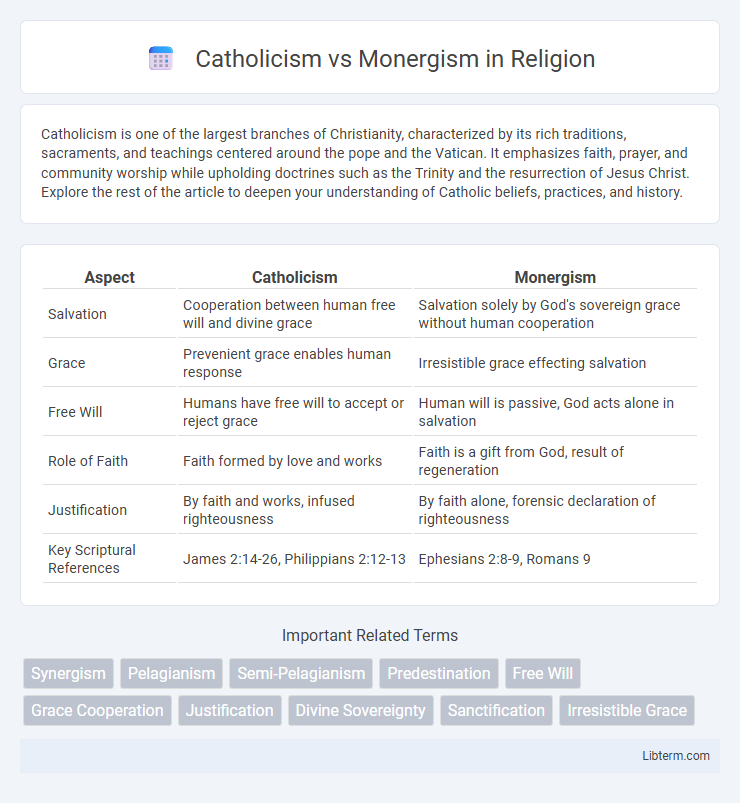Catholicism is one of the largest branches of Christianity, characterized by its rich traditions, sacraments, and teachings centered around the pope and the Vatican. It emphasizes faith, prayer, and community worship while upholding doctrines such as the Trinity and the resurrection of Jesus Christ. Explore the rest of the article to deepen your understanding of Catholic beliefs, practices, and history.
Table of Comparison
| Aspect | Catholicism | Monergism |
|---|---|---|
| Salvation | Cooperation between human free will and divine grace | Salvation solely by God's sovereign grace without human cooperation |
| Grace | Prevenient grace enables human response | Irresistible grace effecting salvation |
| Free Will | Humans have free will to accept or reject grace | Human will is passive, God acts alone in salvation |
| Role of Faith | Faith formed by love and works | Faith is a gift from God, result of regeneration |
| Justification | By faith and works, infused righteousness | By faith alone, forensic declaration of righteousness |
| Key Scriptural References | James 2:14-26, Philippians 2:12-13 | Ephesians 2:8-9, Romans 9 |
Understanding Catholicism: Core Doctrines and Beliefs
Catholicism centers on the doctrines of the Trinity, the divinity of Jesus Christ, the sacraments, and salvation through faith and works, emphasizing the Church's authoritative role in interpreting Scripture and tradition. It teaches that grace, infused through the sacraments, enables human cooperation with God's will, contrasting with monergism's view of salvation as solely the work of divine grace without human contribution. Key Catholic beliefs include the authority of the Pope, the veneration of saints, and the importance of both faith and good deeds in achieving salvation.
Monergism Defined: Origins and Key Principles
Monergism, rooted in Reformation theology, emphasizes God's sole agency in the process of salvation, contrasting with Catholicism's synergistic view that cooperation between human free will and divine grace is essential. Originating from the teachings of figures like Martin Luther and John Calvin, monergism asserts that regeneration and justification are acts performed exclusively by God, independent of human effort. Key principles include total depravity, unconditional election, and irresistible grace, underscoring salvation as an unmerited gift granted solely by God's sovereign will.
Historical Development: Catholicism and Monergism in Context
Catholicism, rooted in early Christianity, developed through ecumenical councils and papal authority, emphasizing a synergistic relationship between divine grace and human cooperation in salvation. Monergism originated from the Protestant Reformation, particularly in Reformed theology, asserting that salvation is entirely the work of God's sovereign grace without human contribution. The historical divergence highlights Catholic emphasis on tradition and sacramental grace versus Monergism's focus on predestination and sola gratia doctrine.
Grace and Salvation: Divergent Theological Views
Catholicism teaches that grace is a cooperative process involving both divine initiative and human free will, emphasizing sacraments as conduits of grace essential for salvation. Monergism asserts that salvation is solely the work of God's grace, independent of human effort, where regeneration precedes faith and ensures the elect's salvation. The theological divergence centers on whether grace operates synergistically with human response (Catholicism) or unilaterally without human cooperation (Monergism).
Free Will vs. Divine Sovereignty in Catholic and Monergist Thought
Catholicism emphasizes the harmony between free will and divine grace, teaching that humans cooperate with God's grace in the process of salvation, allowing for genuine human freedom alongside divine sovereignty. Monergism, commonly associated with Reformed theology, asserts that God's sovereign grace alone is responsible for salvation, effectively negating human free will in the initial act of regeneration. This fundamental difference centers on whether human free will cooperates with divine grace (Catholic view) or whether salvation is an entirely divine monergic act without human contribution (Monergist view).
The Role of Sacraments: Catholic Practice vs. Monergist Perspective
Catholicism emphasizes the sacraments as essential means of grace and salvation, with seven sacraments including Baptism, Eucharist, and Confirmation playing a vital role in spiritual life and sanctification. Monergism, rooted in Reformed theology, rejects sacramental efficacy as human cooperation, asserting that salvation is solely the work of God's sovereign grace independent of sacraments. The Catholic view holds that sacraments are instrumental channels through which grace is conferred, while Monergists regard sacraments as symbolic ordinances that witness to an already granted salvation by divine decree.
Scriptural Interpretation: Catholic Tradition vs. Monergist Reading
Catholicism emphasizes a harmonious interpretation of Scripture informed by Sacred Tradition and the Magisterium, viewing the Bible within the Church's living teaching authority. Monergism prioritizes Sola Scriptura, interpreting Scripture independently to assert God's sole role in salvation without human cooperation. This contrast highlights Catholicism's integrative hermeneutic versus monergism's exclusive reliance on textual exegesis for doctrines like grace and predestination.
Church Authority and Individual Assurance
Catholicism emphasizes Church authority as the mediator of grace, teaching that the institutional Church guides salvation through sacraments and ecclesiastical tradition, ensuring communal faith and moral unity. Monergism asserts that salvation is solely the work of God's sovereign grace, granting individual assurance by faith alone without reliance on Church mediation or human effort. The tension between these views highlights differing beliefs about the role of ecclesiastical structures versus personal faith in achieving and affirming salvation.
Major Debates and Controversies: Catholicism vs. Monergism
Catholicism emphasizes cooperation between divine grace and human free will in salvation, while Monergism asserts that God alone effects regeneration without human contribution. Key debates focus on the nature of grace, predestination, and free will, with Catholics rejecting the Monergist view of irresistible grace and total depravity. Controversies often center on scriptural interpretations, such as Romans 9 and Ephesians 2, where Catholics promote synergism as essential for genuine faith and repentance.
Contemporary Relevance and Dialogue
Catholicism emphasizes cooperative grace involving human free will and divine assistance, fostering dialogue on salvation and moral responsibility in contemporary theology. Monergism, rooted in Reformed traditions, stresses God's sole agency in regeneration, prompting discussions on predestination and human inability in modern evangelical circles. Engaging these perspectives enriches ecumenical conversations, addressing challenges of faith, grace, and human participation in spiritual transformation today.
Catholicism Infographic

 libterm.com
libterm.com